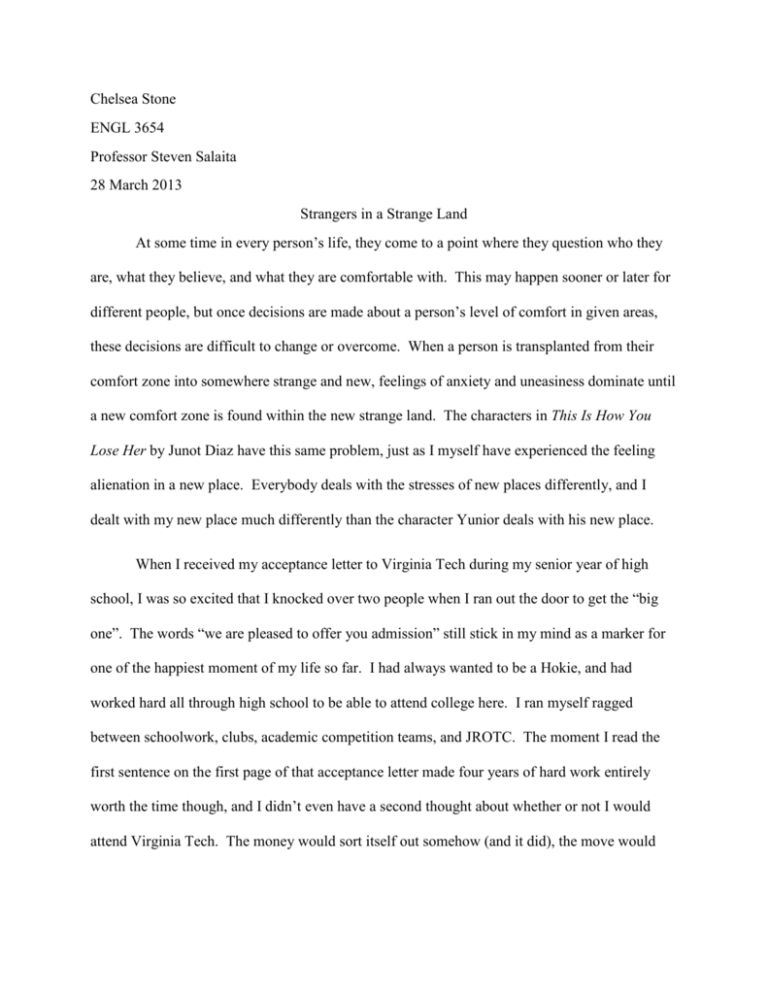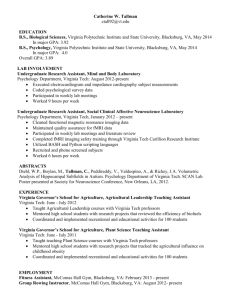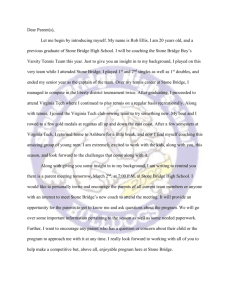Alienation and Identity: An Essay on Cultural Adjustment
advertisement

Chelsea Stone ENGL 3654 Professor Steven Salaita 28 March 2013 Strangers in a Strange Land At some time in every person’s life, they come to a point where they question who they are, what they believe, and what they are comfortable with. This may happen sooner or later for different people, but once decisions are made about a person’s level of comfort in given areas, these decisions are difficult to change or overcome. When a person is transplanted from their comfort zone into somewhere strange and new, feelings of anxiety and uneasiness dominate until a new comfort zone is found within the new strange land. The characters in This Is How You Lose Her by Junot Diaz have this same problem, just as I myself have experienced the feeling alienation in a new place. Everybody deals with the stresses of new places differently, and I dealt with my new place much differently than the character Yunior deals with his new place. When I received my acceptance letter to Virginia Tech during my senior year of high school, I was so excited that I knocked over two people when I ran out the door to get the “big one”. The words “we are pleased to offer you admission” still stick in my mind as a marker for one of the happiest moment of my life so far. I had always wanted to be a Hokie, and had worked hard all through high school to be able to attend college here. I ran myself ragged between schoolwork, clubs, academic competition teams, and JROTC. The moment I read the first sentence on the first page of that acceptance letter made four years of hard work entirely worth the time though, and I didn’t even have a second thought about whether or not I would attend Virginia Tech. The money would sort itself out somehow (and it did), the move would Stone 2 sort itself out (and it did), and I would graduate from Tech with great experiences I was sure I would have. I hail from a small town, much smaller than Blacksburg, about an hour’s drive to the south of Virginia Tech’s campus. The thought never crossed my mind to prepare myself for the culture shock I was about to face. I thought with Virginia Tech being so close to what I called home, I would have no trouble finding people just like me to befriend. The reality, however, was different entirely. On move-in day, my RA, though very sweet and helpful, asked me where I was from. I answered “Wytheville” without hesitation, smiled, and continued to move all my things from home into my new room. The more people I met, the more of a trend I found—they were laughing at me, and I had no clue why. I wasn’t saying anything particularly funny. I didn’t understand until I had been in Blacksburg for about three weeks, and I was telling a friend that I had to go home that weekend to change the oil in my car. She looked genuinely confused and asked, “You have to do what?” I told her again—I had to change my oil. It took a third time telling her my goals for the weekend before she finally understood me and burst out laughing. I asked what was so funny, and she looked at me and said “oyyeell”, making sure to overly pronounce every syllable the word had, in her opinion. I just laughed, said the word “oil” again, and watched as she fell into another fit of laughter. She then asked me to say the words “boil”, “coil”, “foil”, and so forth until I got aggravated and just walked away. Thinking it was a wonderful idea, I took an Intro. to Appalachian Studies class during my first semester. I had caught on to why I didn’t fit in here, and kept my mouth shut for the entirety of the semester. Unfortunately, there was a required presentation at the end, and that was when I was forced to speak up. Everyone sat silent while I talked about June Carter Cash, Stone 3 and no sooner had the words “thank you” left my mouth than the professor stood up and asked, excitedly, where I was from. Yunior and his family face many of the same challenges that I did upon my arrival at college. I was frequently looked down upon and thought to have some lesser intelligence than others simply because of the way I spoke. When Yunior first arrived in America, he wasn’t even permitted to attempt to actively learn the language. His father tells the family, “it’s best if I take care of the English,” and doesn’t allow Yunior’s mother to leave the apartment they share (Diaz 124). When she tries to persuade him, asking, “how do you expect me to learn?”, he tells her, “you don’t have to learn,” (124). In an effort to teach the boys, she sits them in front of the television, telling them, “it’s like school,” (124). Yunior tells the reader that he would catch her “mouthing the words we were learning, trying to make sense of them,” showing that his mother had a strong desire to learn the language so that she could fit in to her new surroundings (125). A sense of loneliness overtakes the boys and their mother, much as I felt alone during my first few months in Blacksburg. Yunior becomes homesick during his first little bit in the states, and longs for home more than anything. He says, “I dreamed of home, that we’d never left,” (135). He is so miserable where he’s at that he’s ready to give up the “American Dream” to return to his comfort zone. I returned home every weekend during my first semester here, and cried almost every time I had to leave again. The pain of being away from home is very real, and Yunior clearly feels it very strongly during his first few months or years in America. While the trials that Yunior and his family face are much worse than those I endured, I still feel like I can relate to his struggle in a minor sense. No, I never had trouble understanding anyone around me and no, I wasn’t entirely alienated, but I did have my intelligence questioned Stone 4 for no other reason than my Appalachian accent. I have learned first-hand that being judged based on where you’re from is not only entirely unfair, it can also be hurtful at times. It took a full year here before I decided that I was going to be proud of the way I talk, and that I would surely prove false any stereotypes that people applied to me before knowing me. Yunior, his brother, and his mother obviously eventually learn English and find their niche much as I found mine. Yunior clearly underwent struggles that I will never understand, but I still feel a relationship to his character in that, at one time, I, too, was a stranger in a strange land. Stone 5 Works Cited Diaz, Junot. This Is How You Lose Her. New York, New York: Riverhead Books, 2012. Print.











